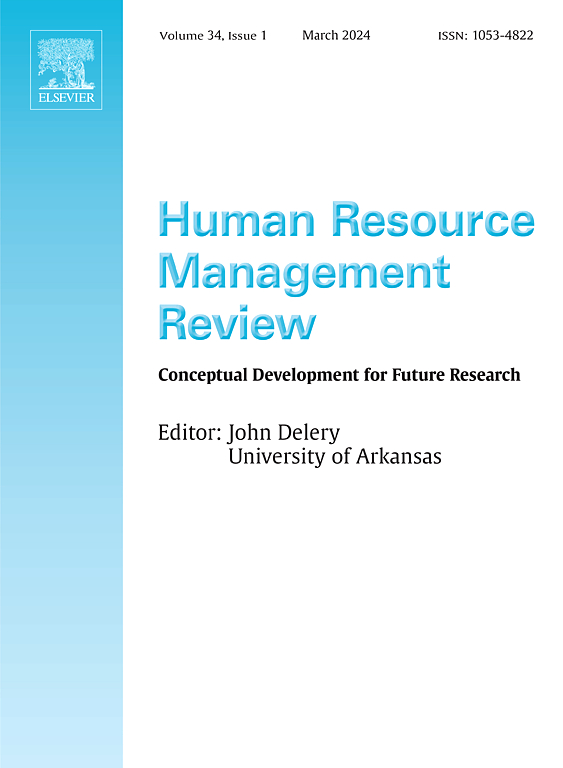The feedforward interview: A theoretical account
IF 13
1区 管理学
Q1 MANAGEMENT
引用次数: 0
Abstract
In the ongoing effort to maximize employee performance, the managerial tools of performance management, performance appraisal, and feedback often fail to produce desirable organizational outcomes. As a remedy, some scholars suggest the Feedforward Interview (FFI), which helps employees identify strengths, develop new behaviors, and improve performance. To promote understanding of the FFI, we detail the theoretical mechanisms activated by each of its five stages and offer new ways to use it. The FFI potentially creates the proximal outcomes of positive emotions, bonding, psychological safety, insights, interviewer knowledge, and satisfaction of intrinsic needs. These outcomes motivate change and improve work performance, collaboration between interviewer and interviewee, and well-being. We discuss differences between feedback and the FFI, boundary conditions, and applications—from performance appraisal and personnel selection to employee, team, leadership, and organizational development—thereby providing managers and practitioners with deeper knowledge and a broader range of potential uses for the FFI.
前馈访谈:一种理论解释
在不断努力最大化员工绩效的过程中,绩效管理、绩效评估和反馈等管理工具往往无法产生理想的组织结果。作为补救措施,一些学者建议采用前馈访谈(FFI),帮助员工识别优势,发展新的行为,提高绩效。为了促进对FFI的理解,我们详细介绍了FFI的五个阶段所激活的理论机制,并提出了使用FFI的新方法。FFI潜在地创造了积极情绪、联系、心理安全、洞察力、面试官知识和内在需求满足的近端结果。这些结果激励改变和改善工作表现,面试官和被面试者之间的合作,以及幸福感。我们讨论了反馈与FFI之间的差异、边界条件和应用——从绩效评估和人员选择到员工、团队、领导力和组织发展——从而为管理者和从业者提供了FFI更深入的知识和更广泛的潜在用途。
本文章由计算机程序翻译,如有差异,请以英文原文为准。
求助全文
约1分钟内获得全文
求助全文
来源期刊

Human Resource Management Review
MANAGEMENT-
CiteScore
20.20
自引率
7.00%
发文量
0
审稿时长
48 days
期刊介绍:
The Human Resource Management Review (HRMR) is a quarterly academic journal dedicated to publishing scholarly conceptual and theoretical articles in the field of human resource management and related disciplines such as industrial/organizational psychology, human capital, labor relations, and organizational behavior. HRMR encourages manuscripts that address micro-, macro-, or multi-level phenomena concerning the function and processes of human resource management. The journal publishes articles that offer fresh insights to inspire future theory development and empirical research. Critical evaluations of existing concepts, theories, models, and frameworks are also encouraged, as well as quantitative meta-analytical reviews that contribute to conceptual and theoretical understanding.
Subject areas appropriate for HRMR include (but are not limited to) Strategic Human Resource Management, International Human Resource Management, the nature and role of the human resource function in organizations, any specific Human Resource function or activity (e.g., Job Analysis, Job Design, Workforce Planning, Recruitment, Selection and Placement, Performance and Talent Management, Reward Systems, Training, Development, Careers, Safety and Health, Diversity, Fairness, Discrimination, Employment Law, Employee Relations, Labor Relations, Workforce Metrics, HR Analytics, HRM and Technology, Social issues and HRM, Separation and Retention), topics that influence or are influenced by human resource management activities (e.g., Climate, Culture, Change, Leadership and Power, Groups and Teams, Employee Attitudes and Behavior, Individual, team, and/or Organizational Performance), and HRM Research Methods.
 求助内容:
求助内容: 应助结果提醒方式:
应助结果提醒方式:


